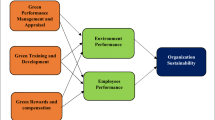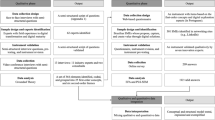Abstract
The objective of this paper is to explore how the various stages of consciousness development of top managers can influence, in practical terms, their abilities in and commitment to environmental leadership in different types of SMEs. A case study based on 63 interviews carried out in 15 industrial SMEs showed that the organizations that displayed the most environmental management practices were mostly run by managers at a post-conventional stage of consciousness development. Conversely, the SMEs that displayed less sustainable environmental management practices were all run by managers at conventional stages of development. Drawing upon diverse examples of environmental leadership, this paper analyzes the reasons why the stages of post-conventional consciousness development of top managers seem to foster corporate greening in SMEs. The study also sheds light on the key values and abilities associated with both environmental leadership and the upper-stages of consciousness development, which include a broader and systemic perspective, long-range focus, integration of conflicting goals, collaboration with stakeholders, complexity management, collaborative learning, among others.

Similar content being viewed by others
References
Ambec, S., & Lanoie, P. (2008). Does it pay to be green? A systematic overview. The Academy of Management Perspectives, 22(4), 45–62.
Anderson, L. M., & Bateman, T. S. (2000). Individual environmental initiative: Championing natural environmental issues in U.S. business organizations. Academy of Management Journal, 43(4), 548–570.
Bansal, P. (2003). From issues to actions: The importance of individual concerns and organizational values in responding to natural environmental issues. Organization Science, 14(5), 510–527.
Bansal, P., & Roth, K. (2000). Why companies go green: A model of ecological responsiveness. Academy of Management Journal, 43(4), 717–736.
Baron, C., & Cayer, M. (2011). Fostering post-conventional consciousness in leaders: Why and how? Journal of Management Development, 30(4), 344–365.
Bartunek, J. M., Gordon, J. R., & Weathersby, R. P. (1983). Developing “complicated” understanding in administrators. The Academy of Management Review, 8(2), 273–284.
Beck, D., & Cowan, C. (1996). Spiral dynamics: Mastering values, leadership, and change. Malden, MA: Blackwell Publishing.
Boiral, O. (2007). Corporate greening through ISO 14001: A rational myth? Organization Science, 18(1), 127–146.
Boiral, O. (2009). Greening the corporation through organizational citizenship behaviors. Journal of Business Ethics, 87(2), 221–236.
Boiral, O., Cayer, M., & Baron, C. (2009). The action logics of environmental leadership: A developmental perspective. Journal of Business Ethics, 85(4), 479–499.
Brown, B. C. (2011). Conscious leadership for sustainability : How leaders with a late-stage action logic design and engage in sustainability initiatives. Santa Barbara: Fielding Graduate University.
Buysse, K., & Verbeke, A. (2003). Proactive environmental strategies: A stakeholder management perspective. Strategic Management Journal, 24(5), 453–470.
Chen, Y. S., & Chang, C. H. (2012). The determinants of green product development performance: Green dynamic capabilities, green transformational leadership, and green creativity. Journal of Business Ethics. doi:10.1007/s10551-012-1452-x.
Cook-Greuter, S. R. (1999). Postautonomous ego development: A study of its nature and measurement. Unpublished doctoral dissertation, Harvard University, Boston.
Cook-Greuter, S. R. (2000). Mature ego development: A gateway to ego transcendence? Journal of Adult Development, 7(4), 227–240.
Cook-Greuter, S. R. (2004). Making the case for a developmental perspective. Industrial and Commercial Training, 36(7), 275–281.
Crossman, J. (2011). Environmental and spiritual leadership: Tracing the synergies from an organizational perspective. Journal of Business Ethics, 103(4), 553–565.
Dechant, K., Altman, B., Downing, R. M., Keeney, T., Mahoney, M., Swaine, A., et al. (1994). Environmental leadership: From compliance to competitive advantage [and executive commentary]. The Academy of Management Executive (1993–2005), 8(3), 7–27.
Du, S., Swaen, V., Lindgreen, A., & Sen, S. (2012). The roles of leadership styles in corporate social responsibility. Journal of Business Ethics. doi:10.1007/s10551-012-1333-3.
Egri, C. P., & Herman, S. (2000). Leadership in the North American environmental sector: Values, leadership styles, and contexts of environmental leaders and their organizations. The Academy of Management Journal, 43(4), 571–604.
Eisenhardt, K. M. (1989). Building theories from case study research. Academy of Management Review, 14(4), 532–550.
Fernández, E., Junquera, B., & Ordiz, M. (2006). Managers’ profile in environmental strategy: A review of the literature. Corporate Social Responsibility and Environmental Management, 13(5), 261–274.
Fisher, D., & Torbert, W. (1991). Transforming managerial practice: Beyond the achiever stage. Research in Organizational Change and Development, 5, 143–173.
Flannery, B. L., & May, D. R. (1994). Prominent factors influencing environmental activities: Application of the environmental leadership model (ELM). The Leadership Quarterly, 5(3–4), 201–221.
Fowler, S. J., & Hope, C. (2007). Incorporating sustainable business practices into company strategy. Business Strategy and the Environment, 16(1), 26–38.
Glaser, B. G., & Strauss, A. L. (1967). The discovery of grounded theory. The British Journal of Sociology (Vol. 20, p. 227). New York: Aldine de Gruyer.
Graham, J. W. (1995). Leadership, moral development, and citizenship behavior. Business Ethics Quarterly, 5(1), 43–54.
Harung, H., Travis, F., Blank, W., & Heaton, D. (2009). Higher development, brain integration, and excellence in leadership. Management Decision, 47(6), 872–894.
Hoffman, A. J. (1999). Institutional evolution and change: Environmentalism and the U.S. chemical industry. Academy of Management Journal, 42(4), 351–371.
Joiner, W. B., & Josephs, S. A. (2007). Leadership agility: Five levels of mastery for anticipating and initiating change. San Francisco: Jossey-Bass.
Jose, A., & Lee, S.-M. (2007). Environmental reporting of global corporations: A content analysis based on website disclosures. Journal of Business Ethics, 72(4), 307–321.
Kashmanian, R., Keenan, C., & Wells, R. (2010). Corporate environmental leadership: Drivers, characteristics, and examples. Environmental Quality Management, 19(4), 1–20.
Kearins, K., & Collins, E. (2012). Making sense of ecopreneurs’ decisions to sell up. Business Strategy and the Environment, 21(2), 71–85.
Kegan, R. (1994). In over our heads: the mental demands of modern life. Cambridge: Harvard University Press.
Kegan, R., & Lahey, L. (2009). Immunity to change: How to overcome it and unlock potential in yourself and your organization. Boston: Harvard Business Press.
Loecher, U. (2000). Small and enterprises—Delimitation and the European definition in the area of industrial business. European Business Review, 12(5), 261–264.
Loevinger, J., Wessler, R., & Redmore, C. (1970). Measuring ego development: Vol. 2. Scoring manual. San Francisco: Jossey-Bass.
Maak, T. (2007). Responsible leadership, stakeholder engagement, and the emergence of social capital. Journal of Business Ethics, 74(4), 329–343.
Maak, T., & Pless, N. M. (2006). Responsible leadership in a stakeholder society—A relational perspective. Journal of Business Ethics, 66(1), 99–115.
Manners, J., & Durkin, K. (2001). A critical review of the validity of ego development theory and its measurement. Journal of Personality Assessment, 77(3), 541–567.
Metcalf, L., & Benn, S. (2013). Leadership for sustainability: An evolution of leadership ability. Journal of Business Ethics, 112(3), 369–384.
Perry, C. (1998). Processes of a case study methodology for postgraduate research in marketing. European Journal of Marketing, 32(9/10), 785–802.
Pfaffenberger, A. H., Marko, P. W., & Combs, A. (2011). The postconventional personality. Albany: State University of New York Press.
Revell, A., & Blackburn, R. (2007). The business case for sustainability? An examination of small firms in the UK’s construction and restaurant sectors. Business Strategy and the Environment, 16(6), 404–420.
Revell, A., Stokes, D., & Chen, H. (2010). Small businesses and the environment: Turning over a new leaf? Business Strategy and the Environment, 19(5), 273–288.
Rogers, K. S. (2012). Exploring our ecological selves within learning organizations. The Learning Organization, 19(1), 28–37.
Rooke, D., & Torbert, W. R. (1998). Organizational transformation as a function of CEOs’ developmental stage. Organization Development Journal, 16(1), 11–28.
Rooke, D., & Torbert, W. R. (2005). Seven transformations of leadership. Harvard Business Review, 83(4), 66–76.
Roy, M.-J., Boiral, O., & Lagacé, D. (2001). Environmental commitment and manufacturing excellence: A comparative study within Canadian industry. Business Strategy and the Environment, 10(5), 257–268.
Shafer, W. (2006). Social paradigms and attitudes toward environmental accountability. Journal of Business Ethics, 65(2), 121–147.
Sharma, S. (2000). Managerial interpretations and organizational context as predictors of corporate choice of environmental strategy. Academy of Management Journal, 43(4), 681–697.
Strauss, A., & Corbin, J. (1990). Basics of qualitative research: Grounded theory procedures and techniques. Basics of qualitative research techniques and procedures for developing grounded theory. Thousand Oaks: Sage Publications.
Strijbos, J. W., & Stahl, G. (2007). Methodological issues in developing a multi-dimensional coding procedure for small-group chat communication. Learning and Instruction, 17(4), 394–404.
Stubbs, W., & Cocklin, C. (2008). An ecological modernist interpretation of sustainability: The case of Interface Inc. Business Strategy and the Environment, 17(8), 512–523.
Sweet, S., Roome, N., & Sweet, P. (2003). Corporate environmental management and sustainable enterprise: The influence of information processing and decision styles. Business Strategy and the Environment, 12(4), 265–277.
Torbert, W. R., & Livne-Tarandach, R. (2009). Reliability and validity tests of the Harthill leadership development profile in the context of developmental action inquiry. Integral Review, 5(2), 133–151.
van Kleef, J. A. G., & Roome, N. J. (2007). Developing capabilities and competence for sustainable business management as innovation: A research agenda. Journal of Cleaner Production, 15(1), 38–51.
van Marrewijk, M. (2003). Concepts and definitions of CSR and corporate sustainability: Between agency and communion. Journal of Business Ethics, 44(2), 95–105.
van Marrewijk, M., & Hardjono, T. W. (2003). European corporate sustainability framework for managing complexity and corporate transformation. Journal of Business Ethics, 44(2), 121–132.
Wilber, K. (2000). Integral psychology. Boston: Shambhala.
Yin, R. K. (1981). The case study crisis: Some answers. Administrative Science Quarterly, 26(1), 58–65.
Yin, R. K. (2003). Case study research: Design and methods. Thousand Oaks: Sage Publications.
Acknowledgments
The authors would like to acknowledges financial support received from the Social Sciences and Humanities Research Council (SSHRC) of Canada.
Author information
Authors and Affiliations
Corresponding author
Rights and permissions
About this article
Cite this article
Boiral, O., Baron, C. & Gunnlaugson, O. Environmental Leadership and Consciousness Development: A Case Study Among Canadian SMEs. J Bus Ethics 123, 363–383 (2014). https://doi.org/10.1007/s10551-013-1845-5
Received:
Accepted:
Published:
Issue Date:
DOI: https://doi.org/10.1007/s10551-013-1845-5




